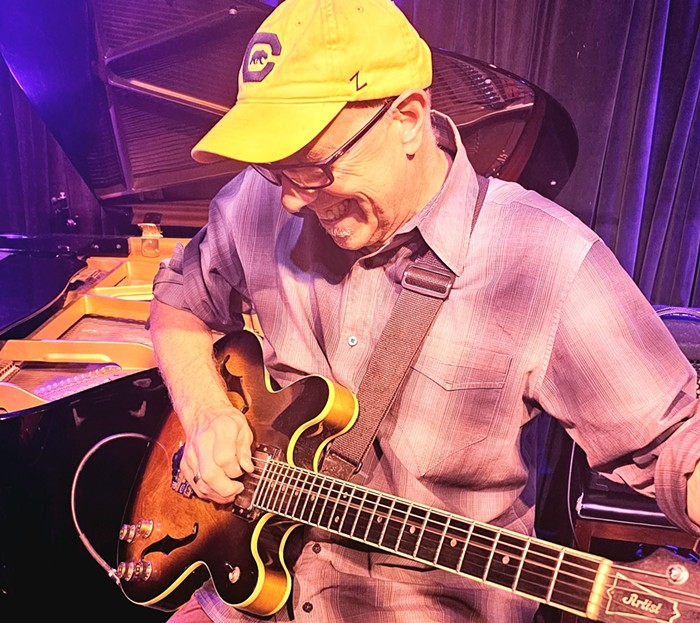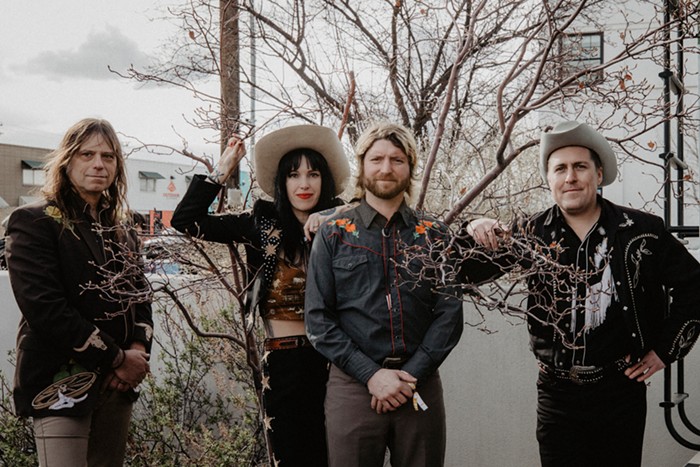RAY RAPOSA tries not to sound jaded as he slurps cocktail droplets from his impressive moustache. After 10 years of making music—and a few weeks shy of his sixth album, Little Death Shaker—this record-promoting rigmarole is old hat. Any fantasy that music is different from any other business is long gone. He's in it because it's his calling, what he has to do. Raposa is only 31, but on the sunny back patio of a bar in his North Portland neighborhood, he carries the world weariness of a man who has been put through the wringer.
Which is not to say that he's bummed out, just grown up. "I'm happier at home now," he says. "And that's obviously not a negative." He has a night job, working at Valentine's downtown, which he says he likes for its low-key atmosphere, and he likes having time to read books. But the best thing going is his new band, Raymond Byron and the White Freighter.
Raposa is best known as Castanets, his critically praised psych-folk band. But, as so often happens in art, acclaim has never really translated to popular success. His first album, Cathedral, achieved a coveted Best New Music stamp from Pitchfork in 2004. Four more albums followed over the next five years, a prolific output for a guy in his 20s who toured constantly.
As Castanets, Raposa expressed a deconstructed, gothic vision of America, which he evidently sees as a deeply weird, often disturbing place, as well as a source of limitless creativity. And the vision has always been all his own: Raposa is the only consistent Castanet, directing the entire process and bringing in a rotating cast of accomplished musicians, a process that led to beautifully inventive albums, but ones that Raposa now calls "artificial, piecemeal constructs."
Raymond Byron and the White Freighter have replaced Castanets for the time being, but Raposa doesn't rule out the possibility of the two coexisting. For now, he seems relieved to be sharing some of the burden.
"These folks got more clearance and leeway than in the past, to the album's benefit," he explains. "People chipped in on parts, expanding into areas I wouldn't have explored. It turned into a more immediate, visceral thing... it's more honest this way."
Little Death Shaker is Raposa's most energetic ("optimistic" is too strong a word) album, steeped in the twang of Southern roots and the truck-stop imagery that he has always drawn upon. But this is an album that somebody's dad could get into, the same guy who would have shaken his head in mystification at most Castanets songs. At times, there's still a whiff of Castanets-style weirdness—"Stateline" is nearly 10 minutes of fuzzed-out, slow-tempo anguish. This is immediately followed by the tender roadhouse nostalgia of "Meridian, MS," back-up vocals courtesy of Matthew Houck (otherwise known as Phosphorescent), a song Raposa describes as "a sock-hop 6/8 cruiser." "There's gators in the water and snakes in the sand," he sings, tenderly.
The thread that connects the White Freighter to Castanets is the overwhelming sense of place, of actual locations. "Geographically informed writing happens on the road, because of the places we've passed through," he says.
This is Raposa underestimating his own worldview. Most musicians pass through a lot of places on tour, and most of them never manage to evoke such a bleakly fascinating picture of their country and the people who live there.



















